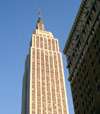|
|
|
Law Firm to pay $18.5 M to Enron's Estate
Breaking Legal News |
2007/01/24 12:46
|
Texas law firm avoids court action by paying millions to settle potential malpractice claims over Enron advice A law firm in Texas is to pay Enron's estate $18.5 in settlement over potential malpractice claims pertaining to legal advice the firm allegedly offered the company over asset transactions. The settlement follows a report by a court-appointed bankruptcy examiner, which stated that the firm may have committed malpractice in approving 28 transactions that involved asset transactions, alleged to have been disguised as sales. The classification of the transactions in such a manner could have allowed Enron to falsely boost its cash flow. The firm, Andrews Kurth, denied any culpability regarding the advice they gave Enron. 'We have continuously denied wrongdoing and culpability with respect to our work for Enron,' managing partner Howard Ayres said in a statement. 'We felt, though, after the passage of five years, that it was expedient to enter into the settlement to put this matter behind us,' he added. The Enron estate has not officially sued the law firm for allegedly signing off improper deals. However, Houston-based firm, Vinson & Elkins, settled bankruptcy-related litigation for $30m last year, after a bankruptcy examiner alleged the law firm may have committed malpractice for failing to respond to red flags about Enron's accounting practices. A federal bankruptcy judge is still to approve Andrews Kurth's deal. |
|
|
|
|
|
|
MySpace Sues One Of World's Top Spammers
Venture Business News |
2007/01/24 11:39
|
The popular online social networking Web site MySpace.com has sued a Colorado man once accused of being one of the world's top three spammers, saying the man gained access to MySpace profiles using stolen passwords and used the information to send spam bulletins. MySpace, which is owned by News Corp., claims Scott Richter and his various companies, including OptInRealBig.com and Mediabreakway.com, sent millions of spam messages to members using technology that made the messages look like they had come from individual members' accounts. The lawsuit was filed Friday in U.S. District Court in Los Angeles and asks for damages, an injunction preventing Richter and his companies from accessing MySpace, and repayment of all profits gained as a result of the activity. Several calls to Richter were not returned Monday. Managing its rapid growth has been a challenge for MySpace, which has fallen prey to people who launch spam attacks. Unlike random unsolicited e-mails, which are readily identified as junk, the spam bulletins on MySpace appear to be sent by trusted friends, giving them an air of legitimacy.
|
|
|
|
|
|
|
Fulbright to Receive Longevity of Service Award
Law Firm News |
2007/01/24 11:25
|

Fulbright & Jaworski L.L.P.'s exemplary service to the community resulted in the Houston Bar Foundation's awarding its Longevity of Exemplary Service Award today to the international law firm.
The award that typically goes to an individual went this year to Fulbright for the firm's continued commitment to the Houston Volunteer Lawyers Program. Fulbright is the first law firm to receive the award. The Houston Volunteer Lawyers Program sets out to help those with low incomes who may not qualify for other legal aid or assistance. "This marks the sixth year in a row Fulbright has received an award from the Houston Bar Foundation for contributions to the Houston Volunteer Lawyers Program," said Tracie Renfroe, chair of the Houston Bar Foundation. "While we typically give this award to an individual, Fulbright has devoted itself to this cause through endless hours of pro bono work and a dedication to doing all it can to help the community." Fulbright attorneys completed an average of more than 60 hours each of pro bono work in 2005 and 2006. When attorneys at the firm give back to the communities in which they work, Fulbright becomes an even better law firm, said Steven B. Pfeiffer, chair of Fulbright's Executive Committee. "Since its founding in 1919, Fulbright has been committed to improving the communities in which we practice law, as well as the lives of our fellow citizens who are not as fortunate as we, Pfeiffer said. "We have always been leaders in the area of pro bono work - leaders in the level of contributions we make, and leaders in creating programs to provide legal services for those who cannot afford such representation. Fulbright is committed to continuing this leadership." Among the notable pro bono cases Fulbright has handled through its relationship with the Houston Volunteer Lawyers Program is the recent successful defense of a Nigerian woman's possession of her U.S.-born daughter. The girl's father filed a Hague Convention petition requesting the girl be returned to him in Belgium. Such Hague Convention petitions set out to secure international cooperation when it comes to returning a child wrongfully taken by a parent from one country to another. The mother, who claimed her ex-husband was abusive, had immigrated legally to the U.S. with her daughter in 2002. With Fulbright's help, the mother successfully fought the claims in the Hague Convention petition. A federal judge cleared the way for the 6-year-old to remain enrolled in school and with her mother in the United States. "The ability to help clients who may not otherwise be able to afford legal advice that so greatly impacts their lives underscores the importance of our pro bono work," said Stewart Gagnon, who oversees Fulbright's pro bono efforts. "Our attorneys pour themselves into each and every pro bono case our firm handles and we are always touched and come away as better attorneys as a result of those we assist." In addition to its assistance with individual cases, Fulbright contributes to the community through attorney loan programs the firm has established in a majority of its domestic offices. Through the loan programs, in cities, such as New York, Washington D.C., Los Angeles, Dallas, San Antonio, Minneapolis, Houston and Austin, Fulbright's young lawyers attain courtroom experience prosecuting and defending cases. The cities and other governmental entities involved in the program acquire free assistance as they work to quell their swelling caseloads. Fulbright also has a pro bono initiative to assist immigrant and refugee children who enter the U.S. alone and then attempt to negotiate the immigration courts without representation. No immigrant or refugee has a right to counsel, not even a child. The firm is making significant in-roads in its endeavor to provide representation and other legal assistance to unaccompanied immigrant and refugee children. "A commitment to pro bono work is one of our core values, "said Stephen C. Dillard, chair of Fulbright's worldwide litigation department. "Our pro bono commitment reveals a great deal about our firm's culture and our commitment to improving the lives of our fellow citizens in the communities where we practice law." Fulbright & Jaworski L.L.P. Founded in 1919, Fulbright & Jaworski L.L.P. is a leading full-service international law firm, with more than 1,000 lawyers in 16 locations in Houston, New York, Washington, D.C., Austin, Dallas, Denver, Los Angeles, Minneapolis, San Antonio, St. Louis, Dubai, Beijing, Hong Kong, London, Munich and Riyadh. Fulbright provides a full range of legal services to both domestic and foreign clients worldwide. The 2007 BTI survey of FORTUNE 1000 general counsel chose Fulbright as "The BTI Client Service 30" A-Team and Corporate Board Member magazine named Fulbright among the top 20 corporate law firms in the U.S. in their survey of board members of public companies.
For more information, please visit: www.fulbright.com. |
|
|
|
|
|
|
Dominique R. Shelton Joins Kaye Scholer LLP
Law Firm News |
2007/01/24 03:46
|

Los Angeles, January 24, 2007 – Kaye Scholer LLP announced today that highly respected lawyer, Dominique R. Shelton, joins the firm’s Los Angeles Office. Shelton was most recently a partner in the Los Angeles office of Folger, Levin & Kahn LLP.
Shelton focuses her practice on complex commercial litigation with particular experience in the areas of unfair competition, intellectual property, antitrust and general commercial litigation. "We are delighted to welcome Dominique to Kaye Scholer,"said Los Angeles office managing partner Michael Fernhoff. "She is a top quality litigator and her specific expertise in complex litigation, including antitrust, copyright, trademark, and trade dress is a great addition to the firm's already leading litigation department." In addition to her various professional affiliations, Shelton is an active member of the community, currently serving as the 2005-2006 President of Women Lawyers Association of Los Angeles (WLALA), the oldest and one of the largest local women's bar associations in the country. She is a Life Member of both Black Women Lawyers Association of Los Angeles (BWL) and California Women Lawyers Association (CWL), having served as a past-member of both organizations' Board of Directors. In addition, Shelton participated in the National Urban League’s Black Executive Exchange Program "BEEP" wherein she mentored students attending historically black colleges in Mississippi, Atlanta and Los Angeles. Shelton received her B.A. from Brown University and her J.D. from Georgetown University Law Center where she was notes editor of the Georgetown Journal of Legal Ethics. About Kaye Scholer Kaye Scholer refers to Kaye Scholer LLP and its affiliates, with offices in New York, Chicago, Frankfurt, London, Los Angeles, Shanghai, Washington, D.C., and West Palm Beach. Founded in New York City in 1917, Kaye Scholer now includes some 500 attorneys and represents public and private companies, governmental entities, financial institutions, and other organizations in matters around the world. Additional information is available on the firm’s website: www.kayescholer.com.
|
|
|
|
|
|
|
Lawmakers react to president’s speech
Law Center |
2007/01/23 22:33
|

U.S. Rep. Fred Upton, R-St. Joseph, said Tuesday that President Bush’s State of the Union address was bipartisan in both approach and appeal.
"I think the president understands, for him to get something done in the next two years, he is going to have to be bipartisan," Upton said in a telephone interview following the speech. The Michigan Republican said the president’s tone was genuine and positive, and drew support from both Democrats and Republicans.
"You didn’t have the normal teeter-totter," Upton said of what he called the "one side is up, one side is down" response that often marks State of the Union speeches. Upton praised the president’s energy-saving proposals, but said he does not support an increase in American troops in Iraq. "As much as I’d like to think a troop surge would work, I don’t believe that it will," said Upton. Upton said he supports the bipartisan plan to begin the phase-out of troops at the end of this year. The lawmaker’s comments were among several issued by members of the area’s congressional delegation. U.S. Rep. Joe Donnelly, D-2nd, said in a statement that, "I couldn’t agree more with the president’s message that, as lawmakers, we are here to work across party lines to provide hope and opportunity for every American." Donnelly said he is encouraged by the president’s desire to "establish a steady and clean supply of energy that decreases our dependence on foreign oil." "On the subject of Iraq," Donnelly said, "my greatest concern is that the additional troops that are being sent to Iraq could end up caught in the crossfire of a civil war." Donnelly called for the establishment of specific benchmarks to achieve progress and monthly reports from U.S. generals "detailing the progress being made." U.S. Sen. Richard Lugar said Tuesday that he is encouraged by the president’s proposals to reduce gasoline usage by 20 percent over the next 10 years. The president also called for an increase in the supply of alternative fuels and the modernization of fuel economy standards for cars. Lugar noted that in last year’s State of the Union address the president had declared that "America is addicted to oil," and said the president’s focus had helped spur "new thinking, new policy suggestions and a new realism." Sen. Evan Bayh, D-Ind., called the president’s energy plan "a positive step toward achieving energy independence," adding, "but we can do more." Bayh said he has introduced bipartisan legislation to reduce American dependence on foreign oil and called for the president to embrace what Bayh called "our more aggressive plan." U.S. Rep. Mark Souder, R-3rd, said he supports the president’s plan to increase the supply of renewable and alternative fuels. "But while I support the president’s efforts to secure our border and provide temporary work permits for immigrants, I oppose his plan to grant citizenship to millions of illegal aliens." Indiana Republican Party Chairman Murray Clark praised the speech and said the president’s "commitment to alternative fuels is welcome news here in Indiana."
|
|
|
|
|
|
|
Bush gives State of the Union
Breaking Legal News |
2007/01/23 22:32
|
President Bush pressed for comprehensive immigration reform in his State of Union address Tuesday night, urging US lawmakers to take action to secure US borders, enhance interior and worksite enforcement of immigration laws, create a temporary worker program, resolve "without animosity or amnesty" the status of illegal immigrants already in the US, and promote assimilation.
The call contained in a speech otherwise focused on Iraq and various domestic initiatives on health care, energy and education follows the failure of House and Senate negotiators to come up with agreed legislation in the last Republican-dominated session of Congress despite earlier presidential urgings. Observers suggest bipartisan agreement on key points is more likely under new Democratic leadership, although perhaps without the same emphasis on strict enforcement measures like border fencing that proved controversial earlier this year, although the President did sign a law authorizing a 700-mile-long barrier along the Mexican border.President Bush also called on members of the Senate to give his latest judicial nominees what he labeled a "fair hearing" and a "prompt up-or-down vote," saying that he and lawmakers have a shared obligation to ensure that vacancies in the federal courts are filled.
|
|
|
|
|
|
|
Top NY law firm boosting first-year pay
Legal Business |
2007/01/23 20:31
|
| New York law firms may have to play catch up with Simpson Thacher & Bartlett, which just raised the annual base pay of first-year associates to $160,000 before bonus. The Manhattan firm's move comes less than a year after a similar round of increases bumped first-year salaries in the city to $145,000, after sitting at around $125,000 for five years. "The firm has been very busy and we expect the high level of activity to continue," executive committee chairman Philip Ruegger wrote in a memo. "We are proud of the results we are helping our clients achieve." As in the past, when large firms like 700-lawyer Simpson Thatcher announce a salary hike, others are quick to follow. Paul Weiss Rifkind Wharton & Garrison matched Simpson Thacher's increase to $160,000 Tuesday afternoon. Last February's increase to $145,000 was first announced by Sullivan & Cromwell, and other firms wasted little time jumping on the bandwagon. Firms generally succumb to the pressure to match salaries to remain competitive in nabbing talent from a small pool of top law students. Simpson Thacher's decision also comes after a pay increase at a number of California firms, which upped their first-year salaries to $145,000 from $135,000. New York firms may also follow Simpson Thacher's lead in an effort to maintain the Big Apple's status as the top market for associate pay.
|
|
|
|
|
|
|
Class action or a representative action is a form of lawsuit in which a large group of people collectively bring a claim to court and/or in which a class of defendants is being sued. This form of collective lawsuit originated in the United States and is still predominantly a U.S. phenomenon, at least the U.S. variant of it. In the United States federal courts, class actions are governed by Federal Rules of Civil Procedure Rule. Since 1938, many states have adopted rules similar to the FRCP. However, some states like California have civil procedure systems which deviate significantly from the federal rules; the California Codes provide for four separate types of class actions. As a result, there are two separate treatises devoted solely to the complex topic of California class actions. Some states, such as Virginia, do not provide for any class actions, while others, such as New York, limit the types of claims that may be brought as class actions. They can construct your law firm a brand new website and help you redesign your existing law firm site to secure your place in the internet. |
Law Firm Directory
|
|







